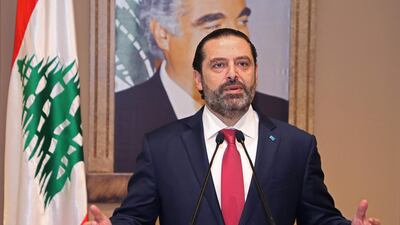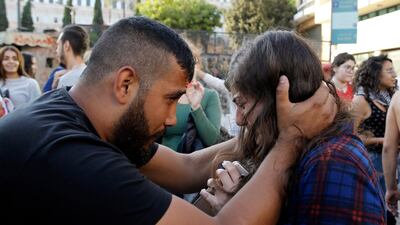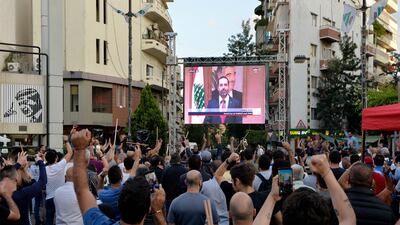The move by Prime Minister Saad Hariri to submit his resignation has made the situation in Lebanon “even more serious,” French Foreign Minister Jean-Yves Le Drian said after the announcement.
Mr Hariri’s resignation as prime minister would collapse the government, should President Michel Aoun accept it.
But Mr Aoun is saying he will hold consultations with political parties before he makes a decision.
This move could take time.
What should happen when a government collapses:
A government collapses when enough ministers walk out or the prime minister resigns. When the president accepts the resignations he instructs Cabinet to become a caretaker administration.
While the ministers stay on to oversee the daily functioning of the country, they make no major decisions and the Cabinet rarely meets.
The president conducts binding consultations with the parties in Parliament who offer their vote for the new prime minister, who must be a Sunni Muslim.
When a candidate is selected, they then hold their own negotiations with political parties in Parliament on the formation of government and the allotting of ministries.
Broadly speaking there is usually either a government of national unity, such as the current administration, that is representative of all the major parties in parliament, or there is a technocrat government.
When all parties agree, the prime minister advises the president that they are ready to form government.
The new administration meets to form a Cabinet that must get parliamentary backing to become official.
Will the president accept Mr Hariri’s resignation?
The current situation is not exactly normal. There is a large, sustained protest movement from across the country and the looming threat of financial meltdown.
Hezbollah leader Hassan Nasrallah said last week that he rejected any reshuffle of the current Cabinet or its resignation.
At this point, the party may advise Mr Aoun, its major Christian ally, not to accept the resignation.
Mr Aoun, local reports say, has also rejected any government shuffle in which his son-in-law and Foreign Minister, Gebran Bassil, is left out.
Mr Bassil has been a focal point of public anger, with chants against him at almost all of the early protests, so his remaining would be unpopular.
Sami Nader, director of the Levant Institute for Strategic Affairs, said it was technically in Mr Aoun’s power to reject Mr Hariri’s resignation but he was unlikely to do so.
“The simple fact is that the prime minister resigned and all the government is now considered a resigned government,” Mr Nader said.
So it is likely that the president will accept the resignation in the coming days.
Not doing so would set the country up for a major political crisis while offering no solution to the troubles it faces.
So, what will happen now?
This is unclear. While the protest movement has remained leaderless and diverse, what most seem to want is a new, non-political administration of technocrats with no parties represented.
It would be very hard to force the parties to accept this and to actively vote for it. But given the level of pressure from the continuing protests, anything is possible.
An alternative put forward by former prime minister Fouad Siniora, who leads Mr Hariri’s Future Movement parliamentary bloc, is for Cabinet to resign in favour of a government of technocrats led by Mr Hariri.
This would keep the man who drafted the plan to fix the country’s infrastructure and improve the financial situation, which is backed by $11 billion (Dh40.4bn) in grants and loans by the international community.
The money depends on significant reforms. Leaving Mr Hariri, who has said that parties in his government were effectively blocking the needed changes, in charge would allow him to carry out his plan.
But it might not placate those on the streets and Mr Hariri might not want to stay on.
It will also be hard to sell to the other parties in Parliament an administration in which he is the sole political representative.
Parties could also push to form another national unity government, but it is unclear if such a move would result in anything different to the current administration and would do little to ease public anger.
Mr Nader said that the current set up had only led to a financial collapse and declining services, and a new approach is needed.
But time is not on Lebanon’s side.
“In my view, Aoun will accept Hariri’s resignation because we’re in a deadlock, and actually this resignation is the only way to open the door for a solution,” Mr Nader said.
“With the current status quo, it was stirring up more tension in the street and polarising or radicalising the street more.”
He said that inaction was accelerating the financial collapse, which was spelt out plainly by central bank governor Riad Salameh on Monday night, when he said the government needed a plan in days.
Mr Nader said that the country needed “a new government that could restore what has been broken with the Lebanese people, and secondly re-establish the links and trust with the international community that Lebanon needs to find the support to get out from the financial crisis”.
Maha Yahya, director of Carnegie Middle East, said that Mr Hariri’s resignation gave protesters one of their key demands while forcing the other parties to take responsibility for future developments.
PROFILE OF CURE.FIT
Started: July 2016
Founders: Mukesh Bansal and Ankit Nagori
Based: Bangalore, India
Sector: Health & wellness
Size: 500 employees
Investment: $250 million
Investors: Accel, Oaktree Capital (US); Chiratae Ventures, Epiq Capital, Innoven Capital, Kalaari Capital, Kotak Mahindra Bank, Piramal Group’s Anand Piramal, Pratithi Investment Trust, Ratan Tata (India); and Unilever Ventures (Unilever’s global venture capital arm)
Padmaavat
Director: Sanjay Leela Bhansali
Starring: Ranveer Singh, Deepika Padukone, Shahid Kapoor, Jim Sarbh
3.5/5
GAC GS8 Specs
Engine: 2.0-litre 4cyl turbo
Power: 248hp at 5,200rpm
Torque: 400Nm at 1,750-4,000rpm
Transmission: 8-speed auto
Fuel consumption: 9.1L/100km
On sale: Now
Price: From Dh149,900
The specs
Engine: 4.0-litre V8 twin-turbocharged and three electric motors
Power: Combined output 920hp
Torque: 730Nm at 4,000-7,000rpm
Transmission: 8-speed dual-clutch automatic
Fuel consumption: 11.2L/100km
On sale: Now, deliveries expected later in 2025
Price: expected to start at Dh1,432,000
Where to donate in the UAE
The Emirates Charity Portal
You can donate to several registered charities through a “donation catalogue”. The use of the donation is quite specific, such as buying a fan for a poor family in Niger for Dh130.
The General Authority of Islamic Affairs & Endowments
The site has an e-donation service accepting debit card, credit card or e-Dirham, an electronic payment tool developed by the Ministry of Finance and First Abu Dhabi Bank.
Al Noor Special Needs Centre
You can donate online or order Smiles n’ Stuff products handcrafted by Al Noor students. The centre publishes a wish list of extras needed, starting at Dh500.
Beit Al Khair Society
Beit Al Khair Society has the motto “From – and to – the UAE,” with donations going towards the neediest in the country. Its website has a list of physical donation sites, but people can also contribute money by SMS, bank transfer and through the hotline 800-22554.
Dar Al Ber Society
Dar Al Ber Society, which has charity projects in 39 countries, accept cash payments, money transfers or SMS donations. Its donation hotline is 800-79.
Dubai Cares
Dubai Cares provides several options for individuals and companies to donate, including online, through banks, at retail outlets, via phone and by purchasing Dubai Cares branded merchandise. It is currently running a campaign called Bookings 2030, which allows people to help change the future of six underprivileged children and young people.
Emirates Airline Foundation
Those who travel on Emirates have undoubtedly seen the little donation envelopes in the seat pockets. But the foundation also accepts donations online and in the form of Skywards Miles. Donated miles are used to sponsor travel for doctors, surgeons, engineers and other professionals volunteering on humanitarian missions around the world.
Emirates Red Crescent
On the Emirates Red Crescent website you can choose between 35 different purposes for your donation, such as providing food for fasters, supporting debtors and contributing to a refugee women fund. It also has a list of bank accounts for each donation type.
Gulf for Good
Gulf for Good raises funds for partner charity projects through challenges, like climbing Kilimanjaro and cycling through Thailand. This year’s projects are in partnership with Street Child Nepal, Larchfield Kids, the Foundation for African Empowerment and SOS Children's Villages. Since 2001, the organisation has raised more than $3.5 million (Dh12.8m) in support of over 50 children’s charities.
Noor Dubai Foundation
Sheikh Mohammed bin Rashid Al Maktoum launched the Noor Dubai Foundation a decade ago with the aim of eliminating all forms of preventable blindness globally. You can donate Dh50 to support mobile eye camps by texting the word “Noor” to 4565 (Etisalat) or 4849 (du).
Our legal consultant
Name: Dr Hassan Mohsen Elhais
Position: legal consultant with Al Rowaad Advocates and Legal Consultants.
The candidates
Dr Ayham Ammora, scientist and business executive
Ali Azeem, business leader
Tony Booth, professor of education
Lord Browne, former BP chief executive
Dr Mohamed El-Erian, economist
Professor Wyn Evans, astrophysicist
Dr Mark Mann, scientist
Gina MIller, anti-Brexit campaigner
Lord Smith, former Cabinet minister
Sandi Toksvig, broadcaster
THREE
%3Cp%3EDirector%3A%20Nayla%20Al%20Khaja%3C%2Fp%3E%0A%3Cp%3EStarring%3A%20Jefferson%20Hall%2C%20Faten%20Ahmed%2C%20Noura%20Alabed%2C%20Saud%20Alzarooni%3C%2Fp%3E%0A%3Cp%3ERating%3A%203.5%2F5%3C%2Fp%3E%0A
PSG's line up
GK: Alphonse Areola (youth academy)
Defence - RB: Dani Alves (free transfer); CB: Marquinhos (€31.4 million); CB: Thiago Silva (€42m); LB: Layvin Kurzawa (€23m)
Midfield - Angel di Maria (€47m); Adrien Rabiot (youth academy); Marco Verratti (€12m)
Forwards - Neymar (€222m); Edinson Cavani (€63m); Kylian Mbappe (initial: loan; to buy: €180m)
Total cost: €440.4m (€620.4m if Mbappe makes permanent move)
Company Profile
Name: JustClean
Based: Kuwait with offices in other GCC countries
Launch year: 2016
Number of employees: 130
Sector: online laundry service
Funding: $12.9m from Kuwait-based Faith Capital Holding
Company Profile
Company name: Yeepeey
Started: Soft launch in November, 2020
Founders: Sagar Chandiramani, Jatin Sharma and Monish Chandiramani
Based: Dubai
Industry: E-grocery
Initial investment: $150,000
Future plan: Raise $1.5m and enter Saudi Arabia next year
The National's picks
4.35pm: Tilal Al Khalediah
5.10pm: Continous
5.45pm: Raging Torrent
6.20pm: West Acre
7pm: Flood Zone
7.40pm: Straight No Chaser
8.15pm: Romantic Warrior
8.50pm: Calandogan
9.30pm: Forever Young















